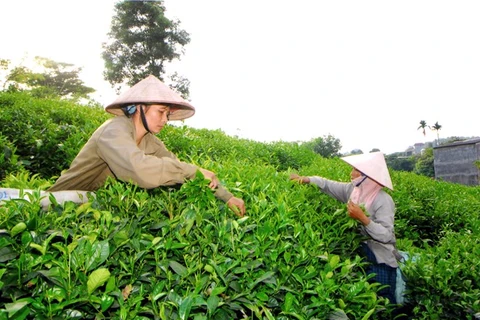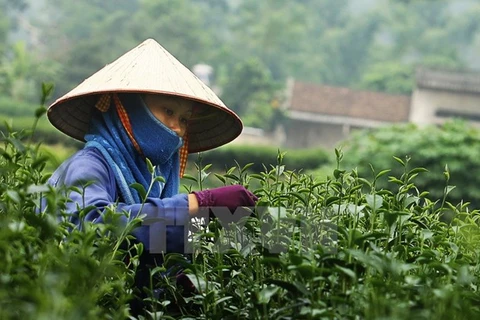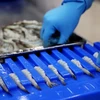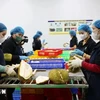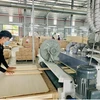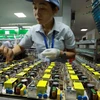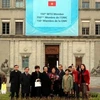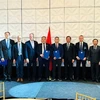Thai Nguyen (VNA) – The northern province of Thai Nguyen plans to splash out 840 billion VND (37 million USD) to restructure its agriculture, over 700 billion VND (30.8 million USD) of which comes from the state budget and the remainder is mobilised from other legal financial resources.
The province is striving to plant new tea seedlings in 80 percent of its total cultivation land by 2020 under a project to shake up agriculture towards increasing added value and sustainable development in the 2017-2020 period.
As a local staple, tea farming land will be expanded to 22,000 hectares, 5,000 hectares of which will be zoned off for organic tea cultivation. The province expects to have at least 300 hectares of tea meeting VietGAP standards.
The restructuring will shift the focus onto plants with high economic efficiency and aquaculture. A large scale production zone will be set up in an area of around 5,000 hectares.
Regarding husbandry, the province will restructure pig herds, develop cross-bred cow, branch out farms applying high technology and build 6-8 standard slaughterhouses. Production chain in agriculture should be paid due attention, ensuring that 70 percent of farms have consumption contracts by 2020.
The provincial agriculture sector will plant 10,000 hectares of large wood trees and 15,000 hectares of intensive small timber while converting 4,300 hectares of poor natural woodland into production forest. Wood production plants will be also constructed in the locality.
The province targets to stabilise forest coverage at 50 percent as well as enhance forest plantation productivity and quality.
Meanwhile, aquaculture will be cultivated following intensive and semi-intensive farming models. The agriculture sector expects to receive over 690 billion VND (30.4 million USD) from aquaculture production value and earn 100 million VND (4,400 USD) per hectare per year.
According to Ngo Xuan Hai, Director of the provincial Department of Agriculture and Rural Development, the province has set up five safe fruit production zones in a total land of more than 390 hectares and eight fresh vegetable plantation zones with total areas of 82 hectares. Some 700 hectares of safe tea were granted with VietGap certification.
Key husbandry areas were thrown up in the locality, including chicken farming in Phu Binh, Dinh Hoa and Vo Nhai districts, and pig raising farms in Phu Binh and Pho Yen districts.
The province has inked a line-up of agreements on organic agriculture investment and consumption for the 2017-2021 period. Accordingly, the locality will plant 250 hectares of rice, 5,000 hectares of tea and 500 hectares of vegetable in concentrating production zones.
Latest evaluation from the provincial People’s Committee showed that small scale production coupled with low rate of industrial processing in agricultural products have hampered local agriculture.
The agriculture restructuring scheme is a key drive to promote agricultural growth, improve livelihood in rural areas and make contribution to realising the national target programme on sustainable poverty reduction and building new style rural areas.-VNA
The province is striving to plant new tea seedlings in 80 percent of its total cultivation land by 2020 under a project to shake up agriculture towards increasing added value and sustainable development in the 2017-2020 period.
As a local staple, tea farming land will be expanded to 22,000 hectares, 5,000 hectares of which will be zoned off for organic tea cultivation. The province expects to have at least 300 hectares of tea meeting VietGAP standards.
The restructuring will shift the focus onto plants with high economic efficiency and aquaculture. A large scale production zone will be set up in an area of around 5,000 hectares.
Regarding husbandry, the province will restructure pig herds, develop cross-bred cow, branch out farms applying high technology and build 6-8 standard slaughterhouses. Production chain in agriculture should be paid due attention, ensuring that 70 percent of farms have consumption contracts by 2020.
The provincial agriculture sector will plant 10,000 hectares of large wood trees and 15,000 hectares of intensive small timber while converting 4,300 hectares of poor natural woodland into production forest. Wood production plants will be also constructed in the locality.
The province targets to stabilise forest coverage at 50 percent as well as enhance forest plantation productivity and quality.
Meanwhile, aquaculture will be cultivated following intensive and semi-intensive farming models. The agriculture sector expects to receive over 690 billion VND (30.4 million USD) from aquaculture production value and earn 100 million VND (4,400 USD) per hectare per year.
According to Ngo Xuan Hai, Director of the provincial Department of Agriculture and Rural Development, the province has set up five safe fruit production zones in a total land of more than 390 hectares and eight fresh vegetable plantation zones with total areas of 82 hectares. Some 700 hectares of safe tea were granted with VietGap certification.
Key husbandry areas were thrown up in the locality, including chicken farming in Phu Binh, Dinh Hoa and Vo Nhai districts, and pig raising farms in Phu Binh and Pho Yen districts.
The province has inked a line-up of agreements on organic agriculture investment and consumption for the 2017-2021 period. Accordingly, the locality will plant 250 hectares of rice, 5,000 hectares of tea and 500 hectares of vegetable in concentrating production zones.
Latest evaluation from the provincial People’s Committee showed that small scale production coupled with low rate of industrial processing in agricultural products have hampered local agriculture.
The agriculture restructuring scheme is a key drive to promote agricultural growth, improve livelihood in rural areas and make contribution to realising the national target programme on sustainable poverty reduction and building new style rural areas.-VNA
VNA


